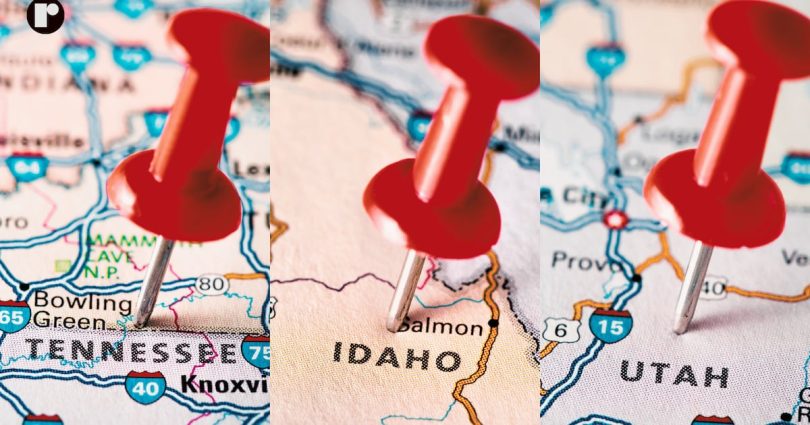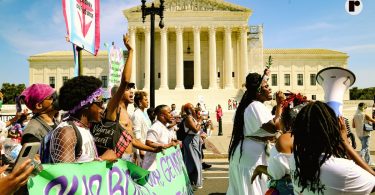How Tennessee, Idaho and Utah became ground zero for America’s anti-trans movement With 55% of transgender individuals unable to access mental health treatments amid a surge of anti-trans legislation, how could it impact the 2024 election and beyond? (Denny Agassi/Getty Images)
Last month in Rexburg, Idaho, Joni Hunt had her Pride flag stolen from her front porch at night—twice.
Hunt is the founder of LGBTQ mental health nonprofit Flourish Point and Rexburg Pride in southeast Idaho. Her mission is simple: provide compassionate, evidence-based, accessible, and affordable mental health care and support services. In doing this, Hunt is currently fulfilling a major need amongst LGBTQ Idahoans.
In an election year where votes can feel like a lifeline for the community, trans, nonbinary and gender-nonconforming people are navigating an ongoing tide of anti-trans legislation aiming to bar access to key rights. The catch? Mental and physical wellbeing of trans communities are on the decline.
That is, according to a report on trans perspectives on the presidential election, released on Aug. 8 by nationwide LGBTQ healthcare provider FOLX Health. Given the hostility faced on the legislative floor where anti-LGBTQ bills hit the highest in history at 642 bills this year, FOLX Health found that 58% of trans people have considered moving to a different state in attempts to seek refuge, while 55% reported not being able to access mental health treatments.
This year, Tennessee, Idaho and Utah have become epicenters of this legislative assault, being among the top three states that have passed the most amount of anti-trans bills. Given the plummeting mental and physical health for trans people nationwide amidst this election year, how are community members in these three impacted states managing?
Dwindling wellness amidst election fears
Around 1 in 5 trans individuals have lost access to healthcare in the past year, according to FOLX Health—a stark reminder of the tangible impacts of anti-LGBTQ policies. In anticipation of the presidential election, nine out of 10 respondents said the results will have a “major impact” on healthcare for LGBTQ people, with 65% saying it will have a “major impact” in their own state.
Additionally, over two-thirds are either accumulating their medications, or delaying or expediting their treatment. Anxiety is also running rampant, with 92% feeling anxious about the presidential election, though it has increased since Biden left the race with Vice President Kamala Harris leading the Democratic ticket.
For trans youth in particular, mental health has already been on the decline since last year, based on a 2023 mental health report by The Trevor Project, which found that 41% of LGBTQ young people seriously considered suicide. Nearly one in three queer, trans and nonbinary youth said their mental wellness was poor most of the time or always due to anti-LGBTQ policies and legislation.
The death of 16-year-old nonbinary high schooler Nex Benedict from Owasso, Okla. one day after they were beaten up in school, echoes not only the current heightened hostility against young LGBTQ people, but also the vulnerability of the community at large given the political climate.
Oklahoma also happens to be the state facing the highest amount of anti-trans bills, at 60 pieces of legislation introduced this year. The state is accompanied by Missouri and South Carolina, who make up for the second and third states with high numbers of anti-trans bills.
However, it is worth noting that Tennessee, Idaho and Utah are the top three states to see the most anti-trans bills passing legislation and becoming laws.
Tennessee faces the worst of it
In Tennessee, where the number of anti-trans bills passed rivals any other state, the trans community has been on a nonstop quest to maintain basic healthcare rights—but not without injury to the community’s wellness. Out of 33 anti-trans bills introduced this year in the state, 10 have passed into law, from healthcare limitations to educational restrictions.
Dahron Anneliese Johnson, a local chaplain and the Nashville community committee co-chair for Tennessee Equality Project, an advocacy nonprofit for LGBTQ Tennesseans, believes that due to the “inciting” and “ill-informed” legislation targeting trans gender-expansive communities in the state, negative health impacts—both psychological and physical—are inevitable.
“The legislators bringing the bills causing such harms and those voting for them have been informed again and again in testimony, phone calls, letters and one-on-one meetings that their legislation will cause hurts, create harms and leave people more vulnerable and prone to poor health,” said Johnson, who is a trans woman herself.
She tells Reckon that anti-trans bills nationwide aim to make it increasingly difficult for trans, nonbinary and gender-nonconforming people to exist in the public sphere because they create a “poisonous climate in which it would be impossible for anyone to flourish and thrive—for anyone to be something other than ‘ill.’” Johnson reports that friends and family have been leaving Tennessee in recent months.
Johnson also sees this moment as detrimental to Tennessee’s vibrancy. In losing LGBTQ constituents and their families who owned homes, had jobs, contributed to their cities, participated in schools, scouts and sports teams leave and “end up taking their talents, diversity and contributions—ability-wise and financially—with them,” she said.
Idaho constituents rely on bordering sanctuary states
Sarah Lynch, executive director of LGBTQ nonprofit Northern Idaho Pride Alliance (NIPA) questions the state’s focus on legislating against transgender people, who make up less than one percent of Idaho’s population according to a 2022 UCLA Williams Institute of Law report.
Despite this, Idaho has passed seven out of 18 introduced anti-trans bills, following Tennessee and Utah’s lead. These bills include enforcing a strict gender binary (House Bill 421), preventing officials from using chosen names and pronouns (House Bill 538), and potentially censoring LGBTQ literature (House Bill 710).
“The debate over these laws is an incredible waste of our taxpayer dollars,” Lynch argues, advocating for a more inclusive approach. NIPA has seen an increase in inquiries for gender-affirming care as Idaho medical professionals navigate new restrictive laws.
To address these challenges, NIPA refers people to neighboring sanctuary state, Washington, for care. However, this solution has its drawbacks, with providers in Spokane overwhelmed and often referring patients to Seattle, where wait times are equally long.
“The gaps and inconsistent care are harming trans folks,” Lynch notes. This issue extends to southwestern Idaho, including Boise. Organizations like Boise Pride Fest are working to support these communities, promoting unity and diversity through events.
Despite the political hostility, the wellbeing of trans Idahoans remains a priority. Donald Williamson, executive director of Boise Pride Fest, describes it as “a critical issue.” Davis Hilton, the organization’s nonbinary marketing coordinator, remains hopeful: “I believe in my generation, and I believe in our youth. I hope for a future that is inclusive of all gender identities, sexualities, and beliefs, but I know that it will take a lot of work from all of us to get there.”
Utah passed a majority of anti-trans bills introduced
Jay Tactay, a trans man of color working with LGBTQ youth at Utah Pride Center, frequently encounters hostility against trans youth in Utah. The state has been particularly successful in passing anti-trans legislation, with seven out of 11 bills becoming law—a 64% success rate.
One such law, House Bill 257, passed in January as the first state in 2024 to do so, bans non-cis people from using public bathrooms in county or recreation facilities that don’t align with their birth certificate sex. Tactay, who testified against the bill in December 2023, says, “To see my youth’s mental health decline because of all these bills is valid. It is also okay to not fight; it is tiring. A lot of my youth are tired. I’m tired.”
Troy Williams, executive director of Equality Utah, the state’s largest LGBTQ civil rights organization, notes that Utah presents a paradox. Despite being a red state, it has passed several protective bills for LGBTQ constituents, including non-discrimination laws and a ban on conversion therapy. However, Williams believes the LGBTQ political movement has failed to effectively engage moderate and center-right Americans.
“We don’t have a cohesive national strategy to reach and persuade moderate and center-right Americans,” Williams told Reckon. “I get it, this is difficult work. But we need to focus more on cultivating the common humanity that we share with others. I don’t see another way out of this precarious political moment.”
Meanwhile, back in Rexburg, Idaho, Joni Hunt responds to her stolen Pride flags with a simple plan: she’ll hang ten more from her rooftop.







